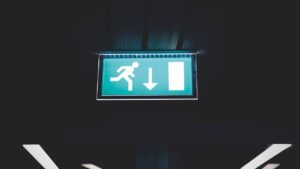Trusting in God Turns Little to Much





Jesus had been teaching the people in a solitary part of the region for much of the afternoon. They had come because they were hungry, not for physical food, but for the truth (spiritual food). The people sought Jesus because they knew He taught the truth. Even though Jesus was physically tired at this point, (since He had originally come with His disciples to this desert location for rest), He was strengthened by the people’s desire to hear and learn God’s Word. Jesus’ disciples, however, rather than trusting in God, grew more concerned with getting physical food for the people than about them hearing the truth.
“And when the day was now far spent, his disciples came unto him, and said, This is a desert place, and now the time is far passed: Send them away, that they may go into the country round about, and into the villages, and buy themselves bread: for they have nothing to eat. He answered…Give ye them to eat. And they say unto him, Shall we go and buy two hundred pennyworth of bread, and give them to eat?
He saith unto them, How many loaves have ye? go and see. And when they knew, they say, Five, and two fishes. And he commanded them to make all sit down by companies upon the green grass…And when he had taken the five loaves and the two fishes, he looked up to heaven, and blessed, and brake the loaves, and gave them to his disciples to set before them; and the two fishes divided he among them all. And they did all eat, and were filled. And they took up twelve baskets full of the fragments, and of the fishes. And they that did eat of the loaves were about five thousand men.”
Mark 6:35-44
Jesus Tested the Disciples
As the evening drew near, the disciples urged Him to send the people away to find something to eat. The idea never occurred to them that perhaps Jesus could provide for their physical needs as well as their spiritual needs. Of course, Jesus was fully aware of their concerns. “When Jesus then lifted up [His] eyes, and saw a great company come unto him, he saith unto Philip, Whence shall we buy bread, that these may eat? And this he said to prove him: for he himself knew what he would do” (John 6:5, 6).
They really believed that Jesus might be out of His mind at this point, because He was expecting them to meet all of these people’s needs.
The Disciples Looked to Themselves for the Solution
Surprised (and perhaps shocked) at His response, rather than trusting in God, the disciples immediately looked to their own selves to provide food for this great assembly. (Some scholars believe that there could have been over 15,000 individuals present). They replied, “…Shall we go and buy two hundred pennyworth [several thousand of dollars worth] of bread, and give them to eat?” (Mark 6:37). They really believed that Jesus might be out of His mind at this point, because He was expecting them to meet all of these people’s needs. They had probably expected Jesus to respond, “You’re right, we really ought to send them back to the nearest villages and let them get fed there.”

Jesus Wanted Them to See Just How Little They Had
Jesus wasn’t fazed by all of this though. Instead, He let them see for themselves just how little they had for such a great need. If they hadn’t known what they had begun with, then the full depth of the miracle that Jesus was about to perform wouldn’t have been realized. After they took the smattering of provisions (enough for only a few to eat) over to Him and had the people sit in an orderly manner on the grass, He blessed and broke the bread, then the fish, and gave them to the disciples to be distributed among the people.
Notice that He never gave any of these provisions directly to the people Himself—it was always through His disciples. In the end, there was so much distributed from the hands of Jesus that everyone was able to eat and be filled. No lack was mentioned and a dozen basketfuls were still leftover.
We Must Go to Jesus First
How many times do we believers in Jesus Christ go to Him first for our needs, both great and small? When Jesus is trusted solely, a small amount yields an overabundance. Trying to meet a great need by ourselves is the same kind of problem as the disciples trying to feed the whole multitude with the tiny provisions that were available.
Jesus never told them to go and buy all of the food, or to take the loaves and fishes and give everyone just a crumb or two of bread. (We won’t even try to determine how much of a portion of those two fish they would have to give!). That is why Jesus told them “you give them something to eat.” He knew that in their hearts that they would say “We can’t; He will have to do something!”

We Are Expected to be Trusting in God
God wants us, as His children, dependent upon Him for our needs. When we look to our self, we take our eyes off of Him, and meeting our need becomes more and more insurmountable to us. The need doesn’t have to be just for food. It can also be in other areas, physical or spiritual. “But Jesus beheld them, and said unto them, With men this is impossible; but with God all things are possible” (Matthew 19:26). The problem comes when we limit God. The disciples tried to limit God, as in the example above of the five thousand being fed, by implying that the people needed to leave in order to be fed.
We Put God in a Box by Limiting Him
They felt that Jesus was so absorbed in teaching and healing the people that He had forgotten about the basic needs of the people and that He needed the disciples to remind Him of this. How often do we limit God, or put Him “in a box,” by saying that He can meet these particular needs, but He probably won’t be able to meet these other needs? How many times are we impatient with Him meeting our needs and without trusting in God, end up taking care of them ourselves? How many times do we hurt or insult God by not having complete faith in Him?
We are to place our needs and circumstances in the hands of Jesus and let go, not picking them up later when He doesn’t respond or do anything in our anticipated timeframe.
We Must Turn It Over to God and Leave It There
We must remember that God is always in control of the situation; we are the ones that lose control and become anxious. We are to place our needs and circumstances in the hands of Jesus and let go, not picking them up later when He doesn’t respond or do anything in our anticipated timeframe.
If we take back the needs that we laid in His hands, we are effectively saying that we aren’t fully trusting in God in everything and that we will take care of it ourselves. Again we are back to limiting God. “[Cast] all your care upon him; for he careth for you” (1 Peter 5:7). Remember that the disciples never even asked Jesus to provide for the people’s needs. How much more will He respond when we really do ask and fully believe?
[Image credits: Featured image
Additional image credits: Featured image (when applicable) by Melissa Askew on Unsplash; Opening images (from top to bottom) photo by Mogens Petersen on Pixabay; image by Gerd Altmann on Pixabay; photo by FrenchByte on Freeimages.com]




